|
Summary:
Every 120 years or so a dark spot glides
across the Sun. Small, inky-black, almost
perfectly circular, it's no ordinary
sunspot. Not everyone can see it, but
some who do get the strangest feeling,
of standing, toes curled in the damp
sand, on the beach of a South Pacific
isle.... Get the full
story from Science@NASA.
Page
1 | Page
2 | Page
3 | Page
4 | Page
5 | Page
6 | Page
7 | Page
8 | Page
9 | Page
10 | Page
11 | Page
12 | This is Page 13
| Page
14
| Page
15
Unless otherwise stated, all images
are copyrighted by the photographers.
|
| |
Photographer,
Location |
Images |
Comments |
|
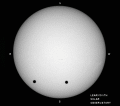
|
Mogens
Winther,
Denmark and Australia
Jun. 08 |
#1,
more
|
High school teacher
Mogens Winther combined his own images
of the Venus transit, obtained in Denmark,
with images captured in Australia by a
GONG network
telescope. The result, shown here, demonstrates
parallax--Venus'
shifting position as viewed from two widely
separated locations on Earth. This is
what 18th and 19th astronomers tried so
hard to measure; the parallax angle could
be used to calculate the distance to Venus
and, thus, the size of the solar system.
|
|
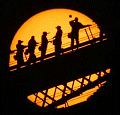
|
David
Finlay,
Sydney, Australia
Jun. 08 |
#1 |
Tourists
climbing the Sydney Harbour Bridge silhouetted
against the setting sun (4:45pm). Venus
was only halfway across the sun at sunset.
Photo taken from the Opera House. Photo
Details: Canon D60, 35-350mm lens. |
|
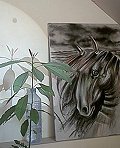
|
J.
Devroede,
Brussels, Belgium
Jun. 08 |
#1,
#2,
#3 |
Just
a couple of pics about the feeling of
the transit in my room, projections on
white cardboard and some larger on the
wall, small 60mm refractor and basic digital
cam. Two rare events : the transit itself
of course and no rain in Belgium! ;-)
|
|
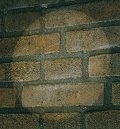
|
Jelmer
Siekmans,
Winsum, Groningen, Netherlands
Jun. 08 |
#1,
#2 |
I
took this picture by beaming the light
coming from my telescope onto the wall
of my house. |
|
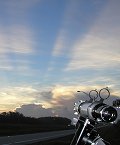
|
Bill
Williams,
Everglades National Park near Big Cypress
National Preserve, southern Florida, USA
on Alligator Alley, mile marker 63
Jun. 08 |
#1,
#2,
#3,
more |
The
sun just peaked out of these clouds 2
minutes before third contact -- very fortunate!
|
|
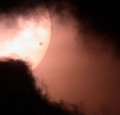
|
John
Stetson,
Southport, CT
Jun. 08 |
#1 |
The
morning clouds parted to reveal Venus. |
|

|
Jadran
Kale,
Sibenik, Croatia
Jun. 08 |
#1,
#2 |
Mihovil
Kale, age 3, observes the transit. Digital
extraction from Sony MiniDV Handycam.
Binoculars used are 80x20 with tripod,
thanks to Boris Kronja. |
|
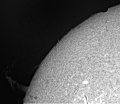
|
Sébastien
Kersten,
Namur, Belgium
Jun. 08 |
#1 |
First
contact plus a solar prominence! |
|
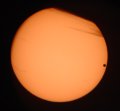
|
Jeff
Delmas,
Huntsville, Alabama
Jun. 08 |
#1 |
This
photo was taken at 6:02 CDT using a Sony
DSC-V1 shooting through an 8” cat.
The viewing at our site was delayed about
15 minutes due to a bank of low clouds
in the East, which are still seen in the
photo obscuring a portion of the Sun. |
more:
from Bruno
David of Reims, France; from
Yu Jun of Nanjing, Jiangshu, China;
from Noeleen
Lowndes at Tamborine Mountain in Queensland,
Australia; from
the Nojum Webcasting Team in Tehran,
Iran; from
Andrew J. Brown of Chelmsford, England,
UK; from
Bachir El-Youssef of Zouk Mosbeh,
Lebanon; from
Jaco Pretorius & Theuns Alberts
of Pretoria, South Africa; from
Thierry Lombry of Brussels; from
Paulo
Cacella
of Brasilia, Brazil; from
Dominic Cantin of Quebec City, Canada;
|
back to spaceweather.com
|
|